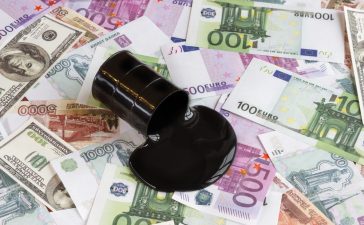Stocks resumed their plunge, wiping out more than $3 trillion this week, and U.S. Treasuries yields hit record lows on Thursday as the coronavirus spreads outside China
Stocks resumed their plunge, wiping out more than $3 trillion in value this week alone, and U.S. Treasuries yields hit record lows on Thursday as the coronavirus spread faster outside China and investors fled to safe havens.
The number of new coronavirus infections in China – the source of the outbreak – was for the first time overtaken by fresh cases elsewhere on Wednesday, raising pandemic fears.
The pan-European STOXX 600 <.STOXX> index opened 2.3% lower and Italy’s blue-chip index <.FTMIB> sank. Dozens of European companies have warned about potential damage to their profits.
In the United States, Microsoft <MSFT.O> became the second trillion-dollar company to warn about its results after Apple. X.Its Frankfurt-listed shares <MSFT.F> were down 4%.
Global equities have now fallen for six straight days. Wall Street’s so-called fear gauge <.VIX> was near its late 2018 highs.
Spot gold <XAU=> rose 0.5% to $1,649 per ounce and silver <XAG=> gained 1% to $18.03 an ounce. Gold prices hit a seven-year high at near $1,688 per ounce on Monday.
Safe-haven currencies are doing very well and gold is heading back higher, and unless we see a slowdown in the coronavirus cases outside China, risk sentiment will continue to be undermined, said Peter Kinsella, global head of FX strategy at UBP in London.
Meanwhile, the yield on U.S. Treasuries, which falls when prices rise, dropped below 1.3% <US10YT=RR> and the yield curve continued to send recession warnings.
Markets are pricing a roughly even chance of the Federal Reserve will cut interest rates next month and have almost fully priced in a cut by April.
Yields on benchmark German 10-year maturities <DE10YT=RR> fell to -0.5140%. Italian debt underperformed as Europe’s worst flare-up of the virus in that country raised fears of a recession there.
E-mini futures for the S&P 500 were down 0.3% <ESc1> and oil, sensitive to global growth, fell more than 1% to its cheapest in over a year.
Analysts have downgraded forecasts for Chinese and global growth, and policymakers from Asia, Europe and the United States have begun to prepare for a steeper economic downturn.
South Korean stocks <.KS11> shed another 1.05% on Thursday, closing at a four-month low, as it reported its largest daily rise in new virus cases since first case last month.
Unnerving investors further, the Bank of Korea kept interest rates unchanged on Thursday, even though it downgraded its growth outlook.
With the infections rate in China slowing, the blue-chip CSI300 index <.CSI300> finished up 0.3%. China’s central bank said on Thursday that it would ensure ample liquidity to help limit the impact of the epidemic.
MSCI’s broadest index of Asia-Pacific shares outside Japan fell 0.5%, taking it more than 4% lower for the week.
Taiwan raised its epidemic response level to the highest possible. Japan’s Nikkei dropped 2% to a four-month low amid more worries the Tokyo Olympic Games would be cancelled or shifted.
Safe-haven currencies such as the Japanese yen and the Swiss franc gained on Thursday with the Japanese currency heading towards 110 yen to the dollar, up nearly 2% so far this week. The dollar fell 0.32%.
That was enough to help drag the China-sensitive Aussie dollar <AUD=D3> from an 11-year low and lend support to the euro <EUR=>.





